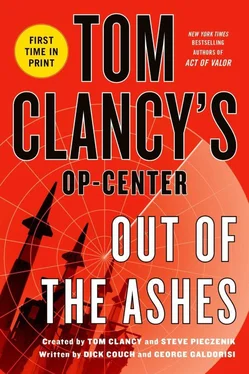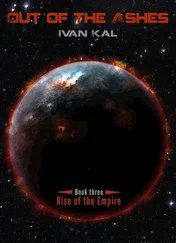Laurie nodded that she understood, but Sandee wasn’t done.
“Best advice I can give you is to just give the skipper a lot of room. He’s risen through the ranks because he gets the job done. Plus, whatever else happens, we’ve got to live with him for the next six months. We all just have to remember why we’re here.”
However, after two harrowing flights in the past several days, and in the foreign environment of a Navy ship at sea, Laurie Phillips had the profound sense of not, in fact, being quite sure why she was here. As Sandee led her through the maze of Normandy ’s passageways and to their small stateroom, Laurie looked toward that future with some apprehension.
The Saudi Arabian Desert
(March 9, 1015 Arabian Standard Time)
Even in March, the Saudi Arabian sun was already baking the desert, the air shimmering in the heat, but Prince Ali al-Wandi was seemingly immune to the weather. He was single-mindedly focused and was in the process of shaping his future. He was far from Riyadh and in the vast Saudi Arabian Desert, but at a location well within range of his Sikorsky S-92 executive helicopter. Al-Wandi watched as his team of handpicked men put the finishing touches on their building project.
He had just left the nondescript blockhouse a few meters away. There, another group of handpicked men, all engineers, were working with the Global Hawk technology his now-dead minion had stolen from the United States. They had their part of the operation almost up and running. The prince conferred with his chief engineer, the man he used as his chief of staff and alter ego. He was a Pakistani named Jawad Makhdoom.
“Do you think the Americans will take the bait?” the man asked.
“I know they will,” al-Wandi replied. “They can’t leave anything in this region alone. Look how they bully our leaders into keeping oil prices at unreasonably low levels, how they meddle in our internal affairs with all this antiterrorism rhetoric, and how they incessantly scold our king with this human rights nonsense.”
“I know,” Makhdoom replied, “and they have been doing it for a long time. But now you’ll make them do what we want them to do, in’shallah.”
“It is more than Allah’s will,” Prince Ali responded. “You’ve explained why the position of this camp is an ideal one. The prying eyes of the Americans don’t miss much and they won’t miss this.”
“Yes, but even if they see it, will it move them to action?” Makhdoom asked.
“I know it will!” al-Wandi replied emphatically. “Look, the government they have worried about for decades just took a huge jog in the direction of instability. The revolution the Syrians suppressed so ruthlessly in 2011 has continued simmering. The Americans will see what they see, and what they want to see.”
They had planned this out so well. As much as he admired the man he had handpicked as his chief of staff, al-Wandi suspected the Pakistani expat did not share his faith that what they were doing would succeed. Yet the man didn’t know everything that Ali al-Wandi did. Nor would he, ever.
“What about the prying eyes in our country? Do you think we’re well protected from discovery here?”
“Oh, don’t worry, we’re completely secure,” Ali al-Wandi replied, surprise registering on his face that his man could think he hadn’t taken care of this aspect of the operation. No, he had paid enough to ensure they would be left alone.
“Then you’re certain the United States will act?”
“Oh, they’ll act, and they will act soon!”
The prince knew he could order the man to do anything he wanted him to do. Yet he wanted to convince him what they were doing was the right thing to do for the kingdom, and not solely to continue to line his own pockets with bribes extracted from the oil deals he had cut. Further, he had not told his assistant about the money Nayef had extracted from him as a personal investment in the project.
“Look, if the Americans are friends of our kingdom shouldn’t they want to intervene with Syria? All they need is an excuse. Look what they did to Libya in 2011, and that country doesn’t have the strategic importance Syria does. If Syria explodes it will set their Mideast strategy back decades and if Syria threatens them, then it squares the circle. They’ll be chomping at the bit, just wait.”
“Yes, I think you’re right,” Makhdoom replied, though the look on his face showed he might yet be a bit skeptical.
Ali al-Wandi could see the man still had doubts. He wanted there to be none.
The prince looked the chief engineer dead in the eye. “Don’t lose confidence now,” he said as he laid his right hand on the man’s shoulder to reassure him. “I’ve listened carefully to what the U.S. president has said and have paid close attention to U.S. security policies.”
“Yes, Your Excellency, but they will have to act preemptively in this case, won’t they?”
“They will. We watched the United States employ its doctrine of preemption against Iraq in 2003, in Libya in 2011, and on other occasions, too. I am confident they’ll use that policy again if they feel they need to. Also don’t forget how this president’s predecessor was criticized for not intervening in Syria years ago.”
For the most part, Prince Ali was doing all this for the power and the money, but at his core he was a Saudi. Geography didn’t lie and he knew enough about history and geopolitics, and was shaken enough by the 2011 Arab Spring uprisings. So he was genuinely concerned for the future of his nation.
As a reasonably devout Sunni, al-Wandi’s nightmare scenario was a region dominated by radical Shias in Iran and their proxies in Syria. No, he rationalized, he had to do this. More than that, he must do this. Not for himself, but for his nation and for future generations of Saudis. Get the United States to decapitate Syria, move in militarily, oust the current government, and put the Sunni majority in charge of the country. That would not only get the oil flowing, but would also wrest Syria away from Iran’s embrace. He would not only be rich; he would also be a Saudi national hero. It was a beautiful plan. The United States would start the dominos falling and would help him achieve his dream. The Americans would do this, and it would be their own idea to boot!
His plan was as simple as it was clever. The Global Hawk would “see” a threat when it overflew what they were building, but it would be tricked into thinking that threat was in Syria. He shook his head in satisfaction. It was almost done and when he activated his plan things would move quickly.
* * *
Far from where Ali al-Wandi and the chief engineer were putting the prince’s plan in motion, two hundred kilometers north of the Syrian oasis city of Tadmur two men were engaged in conversation. The older man sitting in the passenger seat of the four-wheel-drive Range Rover was Hibah Nawal. He was the mukhtar of the Rulawa tribe, the largest of the eight nomadic tribes that roamed Syria’s half-million-square-kilometer desert. His driver, Feroz Kabudi, turned and said, “I don’t know why we aren’t moving this building to the next segment of pipeline. It does not make sense.”
The mukhtar smiled. Feroz meant “fortunate” in Arabic, and Hibah Nawal reflected on how fortunate Feroz was, as indeed were the men of their Rulawa tribe who had elected him as the leader of their tribal council. While he had grown up in the desert doing what most of Syria’s Bedouin population did, herd sheep, he had spent enough time in Tadmur to keep abreast of events in the nations surrounding Syria. The Bedouin tribes were insulated from most of the chaos of Syria’s civil war because Syria’s steppe and desert was considered of little value.
Читать дальше












